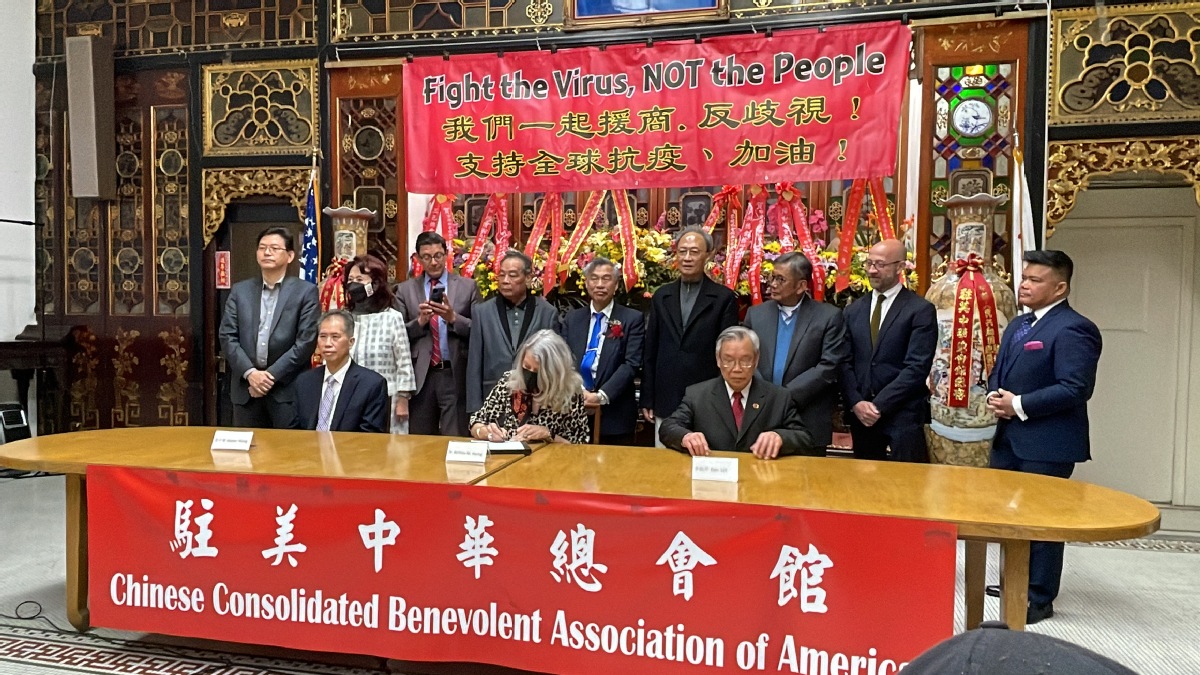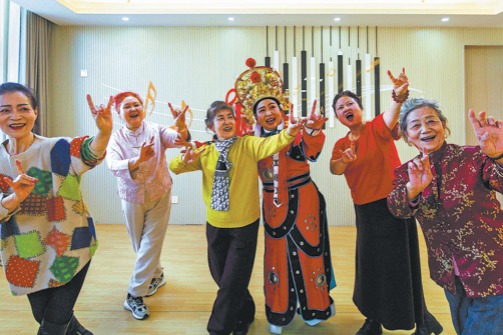San Francisco Chinatown's anti-racism banner added to Smithsonian
By LIA ZHU in San Francisco | China Daily Global | Updated: 2022-05-12 10:46

A banner used in a one of the US' first rallies against anti-Asian hatred during the COVID-19 pandemic has been collected by the Smithsonian's National Museum of American History in an effort to preserve the stories of how Asian American communities face racism.
The museum's director Anthea Hartig officially accepted the 20-by-4-foot red vinyl banner from the San Francisco Chinese Consolidated Benevolent Association (CCBA) during a ceremony Tuesday in San Francisco.
The banner bears the words in English, "Fight the Virus, NOT the People". Below it are the Chinese words: "Together we support the businesses, [we are] against discrimination," and "[We] support fighting the global pandemic, with courage and determination."
It was carried at the front of a 1,000-person procession with representatives from family associations, businesses, community agencies, pastors, local politicians and youth groups in a march against anti-Asian hate on Feb 29, 2020.
"This one artifact shows how members of the oldest Chinatown in North America challenged scapegoating during a public health crisis, a story that traces the ongoing discrimination and violence faced by people of Asian American descent and illuminates their resiliency," said Hartig. "It is a humbling honor to accept this banner on behalf of the nation's flagship history museum," she said.
The donation ceremony was followed by a march by members of the Chinese community to celebrate the banner becoming part of the Smithsonian's permanent collection. The ceremony was the museum's signature event to mark Asian American Pacific Islander Heritage Month, which falls in May.
It is the most recent artifact added to the nation's collections related to the effects, experiences and enormity of the COVID-19 pandemic, according to the museum. It also has collected a digital image by photographer Lucy Xie capturing the banner's prominent display at the front of the community's march against racism.
Julie Tang, a former judge of San Francisco Superior Court who helped with the donation, recalled that she saw the rise in anti-Asian racism almost immediately when the pandemic broke out in the United States and when former president Donald Trump called the coronavirus "the Chinese virus".
"We saw empty Chinatown restaurants and businesses and witnessed random attacks against Asian Americans," she said. Then she and other activists organized the 1,000-person march and an education campaign. "That's where the banner comes from," she said.
"During the pandemic, Asians learned that racism could be more fatal than the virus. And to this day, racial violence against Asians has not subsided. Chinatown business recovery is low, and the scapegoating of Asians in America continues," said Tang.
Since March 2020, nearly 11,000 hate incidents have been reported to Stop AAPI Hate, a national coalition aimed at addressing anti-Asian discrimination, and Chinese Americans continue to report the most hate incidents of all ethnic groups.
The museum is working on a digital program to include interviews with community leaders and organizers. The banner is relevant to the museum's research on public health emergencies, the work of benevolent societies and nonviolent protests.
"This banner will allow us to tell the story about a unique day in our nation's history on Feb 29, 2020, just 11 days before the World Health Organization declared the coronavirus a global pandemic," said Smithsonian curator Theodore Gonzalves at the ceremony.
He said the banner also links to stories of earlier times when the passage of the Chinese Exclusion Act banned migration based on ethnicity and national origin, and when a Filipino writer wrote in 1943 about "the year of the great hatred" that the lives of his fellow migrants were cheaper than those of dogs, and that they were forcibly shoved off streets when they showed resistance.
"Those words were published nearly 80 years ago. And yet they echo loudly as Asian faces today continue to be targets on American streets. Aside from painful stories, this banner will help us consider how solidarity and resistance are at the heart of Asian American history," said Gonzalves.
He said he hoped this banner serves as "a doorway to many more stories about how to face the tough stuff of American history with courage and determination".
























